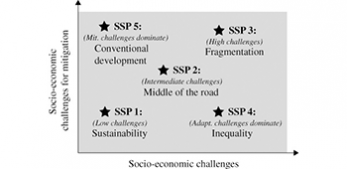Paper
Articles tagged with: Paper
Demographic aspects of climate change mitigation and adaptation
27 APR 2015Paper
In this paper, Wolfgang Lutz and Erich Striessnig address the contribution of changes in population size and structures to greenhouse gas emissions and to the capacity to adapt to climate change.
More
Faster increases in life expectancy will lead to slower population aging
15 APR 2015Paper
In this new paper published in PLOS ONE, W. Sanderson and S. Scherbov show that people become healthier, more capable, and indeed younger in many ways even if they have lived longer lives.
More
Certainty of meeting fertility intentions declines in Europe during the ‘Great Recession’
18 SEP 2014Paper
In this paper M.R. Testa examines the impact of individuals’ perception of negative changes in both their own and their country’s economic performance on reproductive intentions in Europe during the recent “Great Recession”
More
A Population Policy Rationale for the 21st Century
16 SEP 2014Paper
In this new paper, Wolfgang Lutz argues that the world needs a new rationale for population policies which have a priority focus on human capital development, concentrating on education and health.
More
The Persistence of a Two-Child Family Ideal in Europe
15 SEP 2014Paper
Tomas Sobotka and Eva Beaujouan show in their latest article that the ideal family size has become strongly centered at two children all across Europe.
More
Quantifying policy trade-offs to support aging populations
4 MAR 2014Paper
In their latest paper Scherbov, Sanderson and Mamolo show that if labor force participation rates remain at current levels, by 2050 it would be necessary to raise pension ages above age 68 in Europe.
More
Archive: 2025 2024 2023 2022 2021 2020 2019 2018 2017 2016 2015 2014 2013 2012 2011
The Wittgenstein Centre aspires to be a world leader in the advancement of demographic methods and their application to the analysis of human capital and population dynamics. In assessing the effects of these forces on long-term human well-being, we combine scientific excellence in a multidisciplinary context with relevance to a global audience. It is a collaboration among the Austrian Academy of Sciences (ÖAW), the International Institute for Applied Systems Analysis (IIASA) and the University of Vienna.



